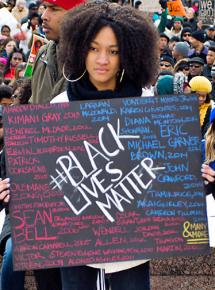Post-post-racial America?
In his column for Inside Higher Ed, reviews a new book that examines approaches to the concepts of white privilege and Black rights.
YOU DON'T hear much about the United States being a "post-racial society" these days, except when someone is dismissing bygone illusions of the late '00s, or just being sarcastic. With the Obama era beginning to wind down (as of this week, the president has just under 18 months left in office) American life is well into its post-post-racial phase.
Two thoughts: (1) Maybe we should retire the prefix. All it really conveys is that succession does not necessarily mean progress. (2) It is easy to confuse an attitude of cold sobriety about the pace and direction of change with cynicism, but they are different things. For one, cynicism is much easier to come by. (Often it's just laziness pretending to be sophisticated.) Lucid assessment, on the other hand, is hard work and not for the faint of spirit.
Naomi Zack's White Privilege and Black Rights: The Injustice of U.S. Police Racial Profiling and Homicide (Rowman & Littlefield) is a case in point. It consists of three essays plus a preface and conclusion. Remarks by the author indicate it was prepared in the final weeks of last year, with the events in Ferguson, Missouri, fresh in mind. But don't let the title or the book's relative brevity fool you. The author is a professor of philosophy at the University of Oregon--and when she takes up terms such as "white privilege" or "Black rights," it is to scrutinize the concepts rather than to use them in slogans.

Despite its topicality, Zack's book is less a commentary on recent events than part of her continuing effort to think, as a philosopher, about questions of race and justice that are long-standing, but also prone to flashing up, on occasion, with great urgency--demanding a response, whether or not philosophers (or anyone else) is prepared to answer them.
Zack distinguishes between two ways of philosophizing about justice. One treats justice as an ideal that can be defined and reasoned about, even if no real society in human history ever "fully instantiates or realizes an ideal of justice for all members of that society." Efforts to develop a theory of justice span the history of Western philosophy.
The other approach begins with injustice and seeks to understand and correct it. Of course, that implies that the philosopher already has some conception of what justice is--which would seem to beg the question. But Zack contends that theories of justice also necessarily start out from pre-existing beliefs about what it is, which are then strengthened or revised as arguments unfold.
"However it may be done and whatever its subject," Zack writes, "beginning with concrete injustice and ending with proposals for its correction is a very open-ended and indeterminate task. But it might be the main subject of justice about which people who focus on real life and history genuinely care."
THE PHILOSOPHER Zack describes may not start out with a theory of what justice is. But that's okay--she can recognize justice, paradoxically enough, when it's gone missing.
I wish the author had clarified the approach in the book's opening pages, rather than two-thirds of the way through, because it proves fundamental to almost everything else she says. She points out how police killings of young, unarmed African-American males over the past couple of years are often explained with references to "white privilege" and "the white supremacist system"--examples of a sort of ad hoc philosophizing about racial injustice in the United States, but inadequate ones in Zack's analysis.
Take the ability to walk around talking on the phone carrying a box of Skittles. It is not a "privilege" that white people enjoy, as should be obvious from the sheer absurdity of putting it that way. It is one of countless activities that a white person can pursue without even having to think about it. "That is," Zack writes, "a 'privilege' whites are said to have is sometimes a right belonging to both whites and nonwhites that is violated when nonwhites are the ones who [exercise] it."
In the words of an online comment the author quotes, "Not fearing the police will kill your child for no reason isn't a privilege, it's a right." The distinction is more than semantic. What Zack calls "the discourse of white privilege" not only describes reality badly but fosters a kind of moral masochism, inducing "self-paralysis in the face of its stated goals of equality." (She implies that white academics are particularly susceptible to "hold[ing]...progressive belief structures in intellectual parts of their life that are insulated from how they act politically and privately...")
Likewise, "the white supremacist power structure" is a way of describing and explaining oppression that is ultimately incapacitating: "After the civil rights movement, overt and deliberate discrimination in education, housing and employment were made illegal and explicitly racially discriminatory laws were prohibited." While "de facto racial discrimination is highly prevalent in desirable forms of education, housing and employment," it does no one any good to assume that "an officially approved ideology of white supremacy" remains embodied in the existing legal order.
None of which should be taken to imply that Zack denies the existence of deep, persisting and tenacious racial inequality, expressed and reinforced through routine practices of violence and humiliation by police seldom held accountable for their actions. But, she says, "What many critics may correctly perceive as society-wide and historically deep anti-Black racism in the United States does not have to be thoroughly corrected before the immediate issue of police killings of unarmed young black men can be addressed."
She is not a political strategist; her analyses of the bogus logic by which racial profiling and police killings are rationalized are interesting but how to translate them into action is not exactly clear. But in the end, justice and injustice are not problems for philosophers alone.
First published at Inside Higher Ed.


